|
|
|
Sort Order |
|
|
|
Items / Page
|
|
|
|
|
|
|
| Srl | Item |
| 1 |
ID:
139574
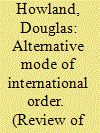

|
|
|
|
|
| Summary/Abstract |
A novel form of international order was developed in the nineteenth century by international administrative unions such as the International Telegraph Union and the Universal Postal Union. This administrative internationalism posed a striking alternative to the international society of great powers, sovereignty, and forms of imperial domination, for the members of administrative unions included not only sovereign states but also semi-sovereigns, vassals, and colonies. Members were equal and bound identically to the union treaty and its international administrative law. This article examines the structure of unions and their politics of membership in the nineteenth century, and engages theories of global governance to argue that early administrative unions present a mode of international order different from theories of both global networks and the international system of neorealism.
|
|
|
|
|
|
|
|
|
|
|
|
|
|
|
|
| 2 |
|
| 3 |
ID:
139571
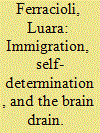

|
|
|
|
|
| Summary/Abstract |
This article focuses on two questions regarding the movement of persons across international borders: (1) do states have a right to unilaterally control their borders; and (2) if they do, are migration arrangements simply immune to moral considerations? Unlike open borders theorists, I answer the first question in the affirmative. However, I answer the second question in the negative. More specifically, I argue that states have a negative duty to exclude prospective immigrants whose departure could be expected to contribute to severe deprivation in their countries of origin. Countries have a right to unilaterally control their borders, but their exercise of this right is constrained by the demands of morality.
|
|
|
|
|
|
|
|
|
|
|
|
|
|
|
|
| 4 |
ID:
139572
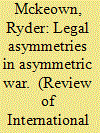

|
|
|
|
|
| Summary/Abstract |
Standard conceptions of the relationship between international law and war in International Relations (IR) mostly oscillate between the sceptical view that law is mostly irrelevant in times of conflict, and the optimistic view that law is a meaningful moral standard that effectively constrains violence. Modern asymmetric conflicts between liberal democratic states and non-state actors such as the Taliban, al-Qaeda, or Hamas challenge these conceptions, however, as they are at once increasingly legal and extremely violent. Drawing inspiration from IR and International Law (IL) scholarship from multiple theoretical paradigms, this article examines the legal asymmetries before, during, and after asymmetric conflict. Noting that law is at once a useful tool and a strong normative force, it argues that a good understanding of legal asymmetries can supplement existing theories of asymmetric war, continue the dissolution of false dichotomies and open up interesting avenues of research in IR, and help both scholars and policymakers understand how international law influences modern asymmetric conflict against non-state actors.
|
|
|
|
|
|
|
|
|
|
|
|
|
|
|
|
| 5 |
ID:
139568
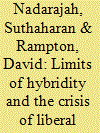

|
|
|
|
|
| Summary/Abstract |
Hybridity has emerged recently as a key response in International Relations and peace studies to the crisis of liberal peace. Attributing the failures of liberal peacebuilding to a lack of legitimacy deriving from uncompromising efforts to impose a rigid market democratic state model on diverse populations emerging from conflict, the hybrid peace approach locates the possibility of a ‘radical’, post-liberal, and emancipatory peace in the agency of the local and the everyday and ‘hybrid’ formations of international/liberal and local/non-liberal institutions, practices, and values. However, this article argues, hybrid peace, emerging as an attempt to resolve a problem of difference and alterity specific to the context in which the crisis of liberal peacebuilding manifests, is a problem-solving tool for the encompassment and folding into globalising liberal order of cultural, political, and social orders perceived as radically different and obstructionist to its expansion. Deployed at the very point this expansion is beset by resistance and crisis, hybrid peace reproduces the liberal peace's logics of inclusion and exclusion, and through a reconfiguration of the international interface with resistant ‘local’ orders, intensifies the governmental and biopolitical reach of liberal peace for their containment, transformation, and assimilation.
|
|
|
|
|
|
|
|
|
|
|
|
|
|
|
|
| 6 |
ID:
139566
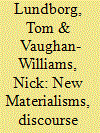

|
|
|
|
|
| Summary/Abstract |
This article investigates the recent ‘New Materialisms’ turn in social and political thought and asks what the potential theoretical and methodological significance might be for the study of International Relations (IR). To do so we return to debates about the theoretical status of discourse in IR as it is in this context that the question of materiality – particularly as it relates to language – has featured prominently in recent years. While the concept of discourse is increasingly narrow in IR, the ‘New Materialisms’ literature emphasises the political force of materiality beyond language and representation. However, a move to reprioritise the politics of materiality over that of language and representation is equally problematic since it perpetuates rather than challenges the notion of a prior distinction between language and materiality. In response, we draw on earlier poststructural thought in order to displace this dichotomy and articulate an extended understanding of what analysing ‘discourse’ might mean in the study of IR.
|
|
|
|
|
|
|
|
|
|
|
|
|
|
|
|
| 7 |
ID:
139570
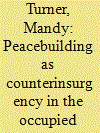

|
|
|
|
|
| Summary/Abstract |
It is often suggested that Western peacebuilding in the occupied Palestinian territory has failed because it has not delivered a viable Palestinian state. But if peacebuilding is reinterpreted as a form of counterinsurgency whose goal is to secure a population, then it has not failed – in fact, on the contrary, it has been quite successful. This article therefore critically evaluates the idea and practice of peacebuilding as counterinsurgency by exploring the symbiosis in the philosophy and methods of COIN and peacebuilding, and charts its implementation in the oPt through the realms of governance, development, and security. It argues that peacebuilding in this context operates as another layer of pacification techniques whose goal is to secure the Palestinian population and ensure acquiescence in the face of violent dispossession.
|
|
|
|
|
|
|
|
|
|
|
|
|
|
|
|
| 8 |
ID:
139573
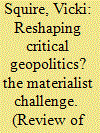

|
|
|
|
|
| Summary/Abstract |
How can the ‘materialist turn’ contribute to the reshaping of critical geopolitics? This article draws attention to the limits of an approach that emphasises the representational, cultural, and interpretive dimensions of geopolitics, while acknowledging the difficulties of an ontological shift to materiality for many scholars of critical geopolitics. It draws on the work of Karen Barad and Annemarie Mol in order to advance three arguments for the reshaping of critical geopolitics as a field of research. First, it argues for an approach to the analysis of power that examines materialdiscursive intra-actions and that cuts across various ontological, analytical, and disciplinary divides. Second, it argues for an analysis of boundary-production that focuses on the mutual enactment or co-constitution of subjects, objects, and environments rather than on performance. Third, it argues for an analytical approach that engages the terrain of geopolitics in terms of a multiplicity of ‘cuts’ that trouble simplifying geopolitical imaginations along with the clear-cut boundaries that these often imply. In so doing, the article makes the case for a more-than-human approach that does not overstate the efficacy of matter, but rather that engages processes of materialisation and dematerialisation without assuming materiality to be a determinant force.
|
|
|
|
|
|
|
|
|
|
|
|
|
|
|
|
| 9 |
ID:
139567
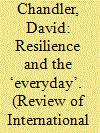

|
|
|
|
|
| Summary/Abstract |
Over the last decade there has been a shift towards critical understandings of ‘liberal peace’ approaches to international intervention, which argue that local culture holds the key to the effectiveness of peace interventions. In this ‘bottom-up’ approach, peace, reconciliation, and a ‘culture of law’ then become secondary effects of sociocultural norms and values. However, these liberal peace critiques have remained trapped in the paradox of liberal peace: the inability to go beyond the binaries of liberal universalism and cultural relativism. This understanding will be contrasted with the rise of ‘resilience’ approaches to intervention – which build on this attention to the particular context of application but move beyond this paradox through philosophical pragmatism and the focus on concrete social practices. This article clarifies the nature of this shift through the focus on the shifting understanding of international intervention to address the failings of the ‘war on drugs’ in the Americas.
|
|
|
|
|
|
|
|
|
|
|
|
|
|
|
|
| 10 |
ID:
139575


|
|
|
|
|
| Summary/Abstract |
The article illuminates the International Relations (IR) enigma of how states with relative low power succeed in gaining privileges reserved for great powers. Many IR studies on status stress the importance of social recognition as a precondition for enjoying the status of a great power. However, very few focus on the factors that affect such recognition. This article tries to fill this gap by looking at systemic wars. Systemic wars are special circumstances wherein a new world order is built and privileges are redistributed among states. In these situations, states may use their symbolic, moral, and circumstantial assets to grant themselves a paramount role in the new order. A state's previous status as a great power, its contribution to victory in a war, and the utilitarian considerations of other countries are all assets that help it to win the privileges reserved for great powers – and that in the long run could gain it recognition as a great power, despite its lack of the requisite capabilities. By using this conceptual framework in the case of France during and after the Second World War, this article tries to explain how a relatively weak power can gain a leading role in a postwar order.
|
|
|
|
|
|
|
|
|
|
|
|
|
|
|
|
|
|
|
|
|